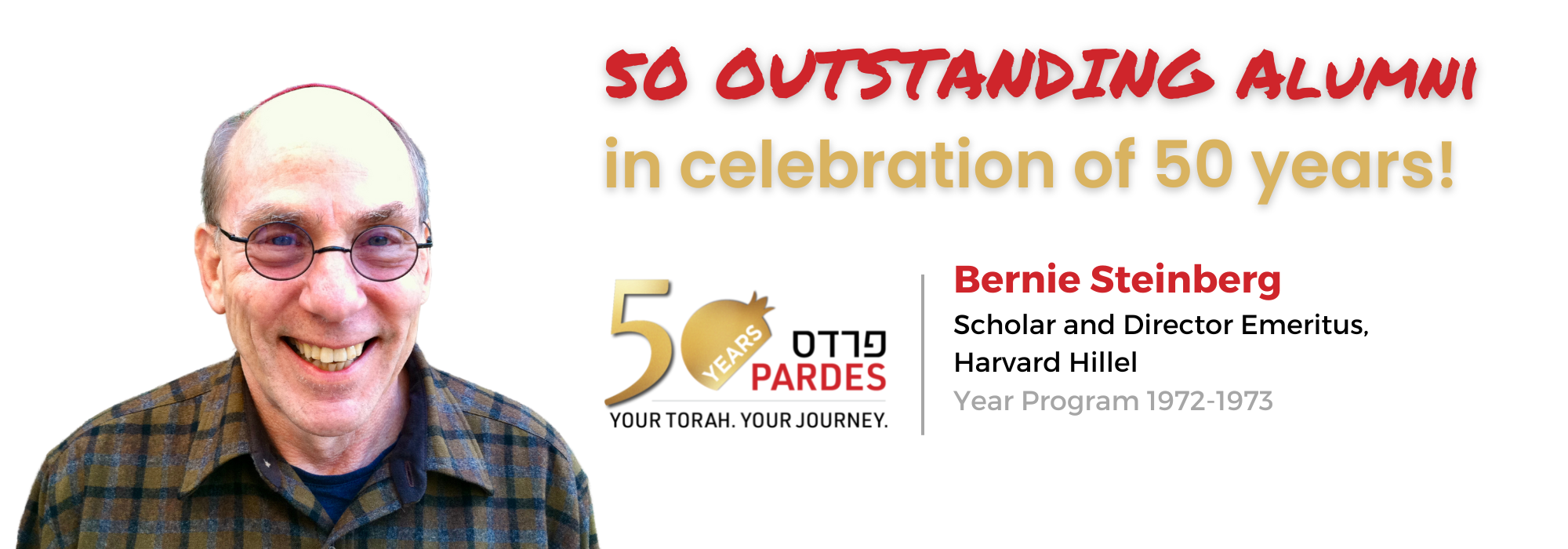
They are leading and creating organizations and businesses of all kinds, responding to humanitarian crises, writing novels, educating at all levels, creating works of art, and so much more! In celebration of Pardes’s 50th, we are highlighting 50 standout alumni whose accomplishments exemplify the rich texture of the Pardes community worldwide.
Dr. Bernie Steinberg is Director Emeritus of Harvard Hillel. He was a founding Fellow of the Shalom Hartman Institute where he served as senior scholar. Bernie was also a recipient of the prestigious Covenant Award in 2010.
WHAT IS YOUR FAVORITE PASSAGE, PASUK, OR TEXT?
I don’t have favorites. On the contrary, it was at Pardes that I first realized that Torah learning is organic, alive, and dynamic. Individual verses, larger passages, and whole narratives are interconnected, multi-dimensional, allusive, cross-illuminating, and in flux. Fresh insights are continually discovered and generated depending, not only on literary contexts, but real-life situations, time and place, and not least— on my state of mind, body, and the hungers of my soul.
IF YOU COULD HAVE ANY SHABBAT GUEST, WHO WOULD IT BE?
My grandparents and parents. How did you have the foresight and courage to flee Shepatovka and Kupel (now Ukraine) in 1919? How could you leave your family behind!? Where exactly were you and what did you endure for the two years from that time until you finally arrived in the US in 1921? How is it that I never heard you express bitterness toward, let alone denigrate “the goyim?”
HOW DOES PARDES CONTINUE TO AFFECT YOU TODAY?
From my time at Pardes to today, my life-work has been a labor of love framed by the Torah conversations catalyzed at Pardes. I continue to devote time and energy in precious discussion with a wide range of Jews (and non-Jews) in many places and of different ages. These intergenerational conversations are a special source of inspiration and hope: it is as if I am having a conversation with the future.
WHAT’S YOUR FAVORITE SPOT IN JERUSALEM?
Too many to count, impossible to evaluate. How can I compare the colorful, noisy, sensual vitality of Machane Yehuda on Friday morning with the transcendent and pervasive stillness of Yom Yippur, even in the public spaces, the streets of Jerusalem? Or brisk jogging through Rehavia to “UN Hill” with leisurely meandering through alleyways in Mea Sha-arim in search of s’farim (Jewish books). In the 13 years my family lived in Jerusalem there were few days when I didn’t feel the sheer power of the place in
countless sites, small and large.
WHAT WAS YOUR FAVORITE CLASS AT PARDES?
I learned important lessons from all my Pardes teachers, but Elie Schweid (Jewish philosophy class) and David Hartman (Talmud class) transformed my life. Deeply rooted in distinctive Jewish communities—Schweid, 1st generation secular Sabra, Hartman, Brooklyn born & Yeshiva educated, both internalized & transcended the “thick” cultures of their communities through intensive and deep Torah learning. They moved beyond apologetics—which took courage and they aspired toward intellectual honesty- which took energy and patience. They challenged me to think hard and struggle painfully with the profoundly Jewish tension between loyalty and quest for truth
WHAT ARE YOU MOST PROUD OF IN YOUR WORK?
More than pride, my true sipuk nefesh—what nurtures my soul is: the fact that so many of my students devote themselves to Jewish teachings in their personal (and many in their professional) lives as life-long learners, as parents, as teachers, rabbis, scholars, and writers. More than a few have become significant voices in the Jewish community and the wider world. And most significantly, the tachlus bottom-line—the quality of their character— in this specific sense: in spite of the broad range of their sensibilities and views, they do not fit into boxes nor do they stereotype others. They respect and understand language; they cherish the sacred ground and real-life fragility of human dignity; they appreciate others as whole, complex, persons. During this polarized, cynical, increasingly nihilistic era, these qualities have become rare but not inexorably dead. My students inspire hope.